Porsche is the greatest name in motorsport. Not the most glamorous, perhaps, but the greatest. No other manufacturer has won as many races and championships in as diverse a range of disciplines. Everything from Formula 1 to Le Mans, hillclimbs to the Dakar Rally.
It’s not just about the headline grabbing victories in big races, either. Porsche has always catered for drivers at every stage of their career. But there’s now a clear ladder to climb that can, in theory at least, take you from newly-licensed novice to a seat in a Le Mans Hypercar. That ladder is of particular interest to me as I’m in the process of getting a racing license, which started with a fitness assessment at Porsche’s Human Performance Centre. Not that I have designs on getting behind the wheel of a 963 at La Sarthe, but I’m fascinated by the paths that can be charted from the bottom to the top of motorsport. And what Porsche can provide may well inform the direction I decide to take.
In the UK, the Porsche ladder starts with the Sprint Challenge GB series. The cars are identical examples of the 718 Cayman GT4 Club Sport, in both ‘standard’ and RS guise. That’s the series novices can race in. It started in 2020 and attracts a mix of gentleman drivers and aspiring pros, about half a dozen of whom have been on their novice cross.
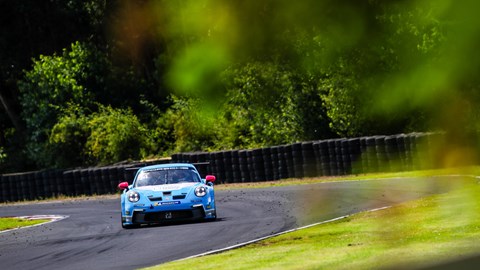
Next up is the Carrera Cup GB, a very well-established series that’s been a proving ground for many drivers who’ve gone on to hugely successful careers. Various iterations of 911 have been used, currently it’s the 992 GT3 Cup car. It’s not just in the UK, either. There are a dozen or so national and regional Carrera Cups around the world, plus the Formula 1-supporting Supercup. Again, you’ll find amateurs and young hotshoes on the grid, plus some established pros. It says a lot that no less than 30 drivers who contested the 2024 FIA World Endurance Championship passed through a Carrera Cup at some point in their career.
Then there’s the GT4-spec Caymans and GT3-grade 911s that can be raced in innumerable GT and endurance series. And, at the top of the tree, there’s the 963 Le Mans Hypercar that races in FIA WEC and the US-based IMSA Sportscar Championship.
“The first thing racing drivers want to know is that they’re playing on a level field. And they know that we run a tight ship in that regard.” So says Porsche GB motorsport manager James MacNaughton, explaining the appeal of the Sprint Challenge and Carrera Cup. I’m in conversation with him at Croft in Yorkshire, where both series are taking their regular slots on the support bill of the British Touring Car Championship.
“We want Sprint Challenge to be a feeder series for the Carrera Cup, so we run it in the same format,” James says. “Not only are the drivers getting used to a GT car, 1300kg-ish with a certain amount of power, they’re also getting used to all of the other things we do for Carrera Cup. So, when they come into Carrera Cup, they know how it works. That’s the same for the teams, we want teams to progress into Carrera Cup as well.”
Toby Trice is one of the drivers hoping to step up from Sprint Challenge GB to Carrera Cup. He joined the series in 2022 as the reigning Ginetta GT Academy champion. “It’s obviously a good natural progression from the Cayman into the 911. I understand it’s quite a different beast to learn to drive and requires a different driving style. But I’m excited for the challenge and, all being well, that will be the plan next year.”
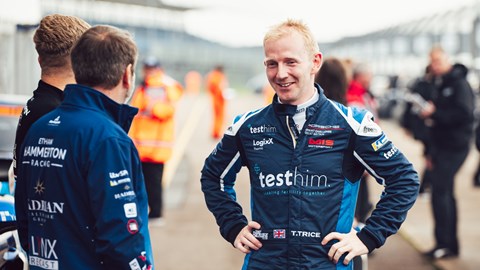
Now 33, Toby came to racing in his late 20s, as a form of therapy. “I was going through a fertility issue with my partner, I felt really depressed. So I went to Buckmore Park just to go and have some fun in rental karts. I called it my medicine. It really was an escape from my demons.” He turned out to have a talent for it, winning the circuit’s driver of the year award. “That gave me the shove to get my race license,” he says, when I caught up with him after the Croft meeting.
After dipping a toe in the water with the Ginetta Racing Drivers Club in 2019, and 2020 plans being derailed by COVID, Toby joined the GT Academy for 2021 and won the championship at his first attempt. He also established Racing for Fertility, using his own experiences to start what can be a very difficult conversation for men to have. “It’s overwhelming the amount of people I’ve met in the paddock and on social media,” he says. “Because of that, there are couples that now have children, which blows my mind.”
Josh Stanton is one of the aspiring pros contesting the Carrera Cup GB . He races in the second-tier Pro-Am category having won the Am class in 2022. “I remember getting in the Cup car for the first time at Brands Hatch, just pulling out of the pitlane thinking oh my god, this is serious,” Josh tells me at Croft. “I never in a million years thought I’d be racing as I am. I recognise how incredibly lucky I am to be doing what I’m doing.”
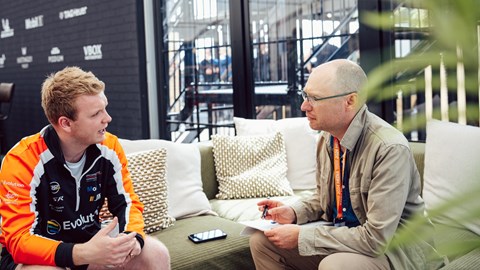
The 25-year-old didn’t take an easy route into motorsport. He did a couple of years of “very low budget” karting while at school, then again at university. But a trip to watch the BTCC inspired him to get into the MINI JCW Challenge. It was a big bite – the JCW cars at the time had notoriously tricky handling. “The fastest way to drive it constantly feels like you’re avoiding a massive accident,” Josh says.
“It was very, very, very tricky,” he admits. “I had done such limited karting in lower level championships, jumping into something where everyone was so well versed, so experienced, your learning curve is a steep one. All the jumps I’ve taken in my motor racing career have been big ones, through no design at all. It’s just the way things have happened.
Abbie Eaton is one of the more established names in the Carrera Cup’s Pro-Am division. She’s best known for her appearances on The Grand Tour but has a long and successful racing record in saloons and GTs, plus two seasons of single-seater racing in W Series. But she didn’t expect to be where she is this year. “This is like Plan C this year, but it should have been Plan A all along,” she told me when we spoke at Croft.
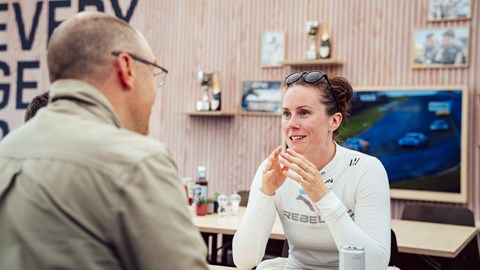
The Rebello Motorsport team she founded raced in the Lamborghini Super Trofeo in 2023. “We had a deal to run in GT3 and GT Open for this year, then plans changed. It was quite late in the season and I wanted to race GTs. It was either British GTs, which was full, or something like this.” The package available from Porsche and TOCA, which organises BTCC meetings, sealed the deal. “I’ve always wanted to race on the TOCA package. And the support and infrastructure that Porsche puts together, you’re not going to find better anywhere else.”
Abbie’s Rebelleo Motorsport project “exists to challenge the status quo in motorsport,” by creating opportunities for people who might otherwise find it difficult to break into the sport. She found a place at Team Parker Racing and got stuck in immediately. “We got the car on a Tuesday night, and then the Wednesday morning we’re at Silverstone running it. It’s probably one of the most fun cars I’ve had the pleasure of driving.”
Fun and fast. Despite leading the bill, the BTCC doesn’t have the fastest cars on the TOCA package – not by a long shot. At Croft, Will Martin’s pole time in the Carrera Cup was over three seconds quicker than Colin Turkington’s for the BTCC. And Seb Hopkins put his RS-class Sprint Challenge car on pole over 1.5 seconds clear of Turkington’s time. “The Carrera Cup car is not an easy car to drive, but they’re blooming quick,” James MacNaughton says. “If you can drive one of these quickly, you can drive anything quickly.”
On paper, Josh Stanton had a really difficult transition from the “very, very stiff” front-engined, front-wheel-drive MINI JCW to the rear-engined, rear-wheel-drive 911 GT3 Cup car. “It is quite a big difference that takes a while to get used to, but that vehicle dynamic suits me a bit better, it works better in my hands. Maybe it was a big jump, but one I enjoyed learning.”
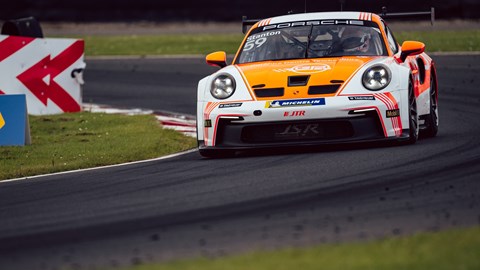
The 991-gen GT3 Cup car that Josh started with was a decidedly tricky customer. The current 992-gen is less fighty, but the racing is still intense. “The championship is so, so competitive,” Josh says. “Pro-Am has taken a step forward, it’s literally between the drivers. You blink in the wrong place and you’re down the grid. Because all the cars are the same, you compare yourself against the best.”
Toby Trice had a similarly big jump from a front-engined, treaded-tyre Ginetta G40 to the mid-engine, slick-shod Cayman. “It was a big step up, in car and performance. The first time I drove the Cayman in anger, I was just blown away by the level of grip mid-corner, just from the tyre alone. The hardest thing to get used to was the weight distribution.
“In the Ginetta, when the rear moved the progression was quite easy to manage. With the Porsche, you’ve got the weight so far back it lets go later and the pendulum effect is more severe. But once it clicked, it just felt natural.” The Caymans have traction control and ABS that can be switched through various levels as the driver’s ability improves but they’re fastest with everything switched off. There are no such luxuries in the 911 GT3 Cup.
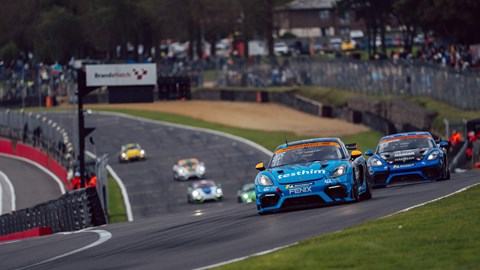
Abbie Eaton has raced a huge variety of cars during her career. Everything from a Citroen Saxo to an Australian V8 Supercar. But the Carrera Cup car still presents challenges. “The window to get the most out of it is very, very small,” she says. “You need a year or two in it to learn the technique. You’ve got to drive it as a Porsche wants to be driven and, when you do it right and hook a lap up, it’s fantastic.”
The standards of driving are very high on the track in Carrera Cup and Sprint Challenge, and they’re high in the paddock – I can vouch for the quality of hospitality Porsche lays on for teams and guests. James MacNaughton: “We expect a lot from teams and drivers in the way they present themselves. It’s in the rules. [The team awnings] have to have a floor, you have to have walls, the team’s kit has to be clean, we don’t allow visible damage on the cars.”
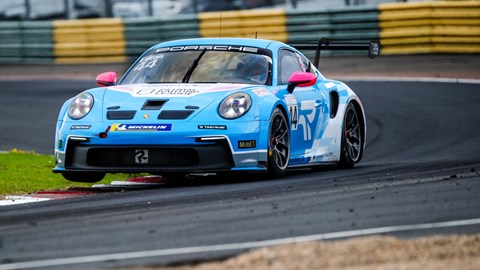
Porsche Motorsport HQ in Germany also imposes high standards and closely polices the rules and regulations. A report is sent in by every Sprint Challenge and Carrera Cup series the Monday after a race weekend that highlights any issues that arose. If any creative interpretations of the rules have been discovered, amendments are sent out to all series for the next meeting.
None of this is exactly cheap, but the budgets required fall quite a long way short of astronomical. It helps that are large percentage of the parts in the 911 GT3 Cup and Cayman GT4 Club Sport are shared with the road cars, keeping costs down. And the cars are eligible for a vast number of other race series, which bolsters residual values.
Neither Abbie, Toby or Josh have personal or family wealth to fall back on. Abbie works extremely hard to make a living in motorsport, Toby and Josh still have full-time jobs as a train driver and engineering consultant, respectively. Instead, they pay for their racing purely through sponsorship.
“With a brand like Porsche, it’s easier [to find sponsorship],” says James MacNaughton. “With a brand you have to explain, that makes the conversation difficult to start with.” Josh got the budget together to race in the MINI Challenge simply by writing to companies and asking. Moving up to Carrera Cup required a heap more cash, but he got a good deal from Team HARD. “The team was coming into the championship, so they were quite generous with the deal they offered us.” His main sponsor is security company Evolution, whose livery his car carries. “It’s all about representing yourself professionally,” Josh says of getting sponsorship.
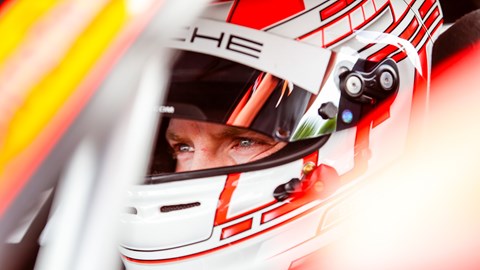
“Firing out emails to random companies might work occasionally for small sponsorship deals, but all the deals I’ve ever done have come from in-person conversations, going and knocking on a company’s door. Behind an email, no-one knows who you are, you can’t get your love for the sport across.”
Toby Trice worked with motorsport sponsorship coach Jess Shanahan (who trades as Racing Mentor) to secure the funding he needed. Focusing on his own story, he gained support from fertility test kit maker TestHim and pharmaceutical company LogixX Pharma. Abbie Eaton sought direct investment for the Rebelleo Motorsport program.
Commercial considerations always come to the fore when choosing which series to race in. Sponsors want a return on their investment and that means putting their name in front of as many people as possible. Josh admits that jumping straight into the MINI JCWs was a bit of a stretch, “however, commercially it worked for us at the time. The Coopers didn’t have the numbers the sponsors needed in return.” The move into Carrera Cup was commercially driven, as well. “Racing with the British Touring Cars doesn’t get any better publicity. The TV coverage is amazing.”
Not being able to self-fund his racing, Toby recognised that he needed to go straight in at a relatively high level to attract sponsors. “I needed to make it commercially viable to jump in a race car and allow sponsors to benefit from it,” he says. “When I did my research, I realised that I needed to be in the British GT or BTCC support paddocks. I knew straight away that would be the best value proposition to a sponsor and it was much, much easier to sell.”
After winning the Ginetta GT Academy, “Porsche approached me to have a go in their Carrera Cup car,” Toby says. “On that day, I had a sit down with my sponsors to discuss what the next best steps would be for them commercially. They were all quite keen to attach themselves to the Porsche marque, and the Sprint Challenge was primarily going to be in the BTCC support paddock. So although the budgets were higher, the value back to those sponsors was bigger.”
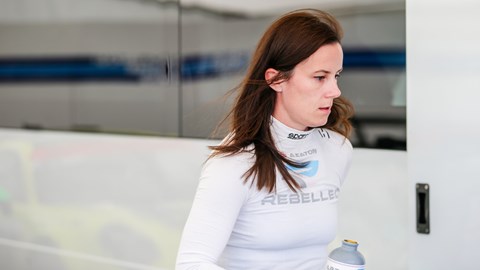
Abbie is well aware of how difficult the money involved can make getting into racing, having spent much of her career only doing a few races a year as funds allowed. “Don’t be put off if you’re knocking on doors trying to get sponsorship,” she says. “Just keep at it. Determination and passion in what you do is really important and that will carry you a long way.”
All three of our drivers are hoping to use their time racing Porsches as a career springboard. James MacNaughton: “Our last junior driver, Adam Smalley, he’s now in British GT and a European GT championship, and the gentleman driver in that car is supporting him, because he’s a very good driver. The next tier up from there, he won’t have to bring anything to the party and he’ll be earning a very high five figure, six figure salary to fly around the world and race GT3 cars.”
Josh Stanton: “I would love to make it full time. I think it’s very, very tricky to do and I also understand that, if it doesn’t come off, I need to have a backup plan. So I enjoy the engineering that I do, but I take racing incredibly seriously and treat it as professional sport and lifestyle. The dream is to go towards endurance racing in GT3 cars. That’s the ultimate dream.”
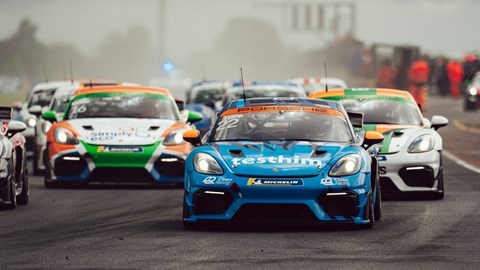
Toby Trice: “The team that I’m with, Clean Racing, and my immediate sponsors, we want to progress up the Porsche pyramid. If I can get the budget together, that will be the plan. I’m coming to a very interesting crossroads, based on my age. My dream has always been to race at Le Mans. If I can make that a reality someday, that would be really special for my own goals, but also to inspire other people that, when you are later on in life, you can still make dreams possible.”
Abbie Eaton is focused as much on her Rebelleo Racing project as her racing. “It’s a platform that we want to help others get into motorsport,” she says. “The accessibility of motorsport is getting worse and worse, and it means that only the few that are wealthy enough can enter the sport. We’ve teamed up with Global Karting League, an electric kart championship, and you can do a season in that for £3000. Compare that to mainstream karting, you’re looking at the same cost to do Carrera Cup nowadays. So we want to partner up with these kinds of organisations and give back to motorsport and try to make it more accessible to people from all backgrounds.”
After the season finale, Josh and Abbie tied for fifth place in the Carrera Cup Pro-Am division. Josh put in a string of consistent finishes, while Abbie scored a groundbreaking first overall Carrera Cup win for a female driver in a sodden Silverstone race. By his own expectations, Toby had a tough season in the top-tier RS Pro division of the Sprint Challenge, finishing the season seventh in the points. Though he was battling back from an enormous crash the previous season.
Talking with Josh, Abbie, Toby (and James) has provided a huge amount of food for thought. Like them, I have no money to draw on and pay my own way through racing. Relying on the kindness of other people to put me in their car might yield one or two drives a year, but that’s not the best way to get good at something. So, if I’m going to pursue racing, I need to do it seriously. I better price up a season in Sprint Challenge and make a start on my sponsor presentation…